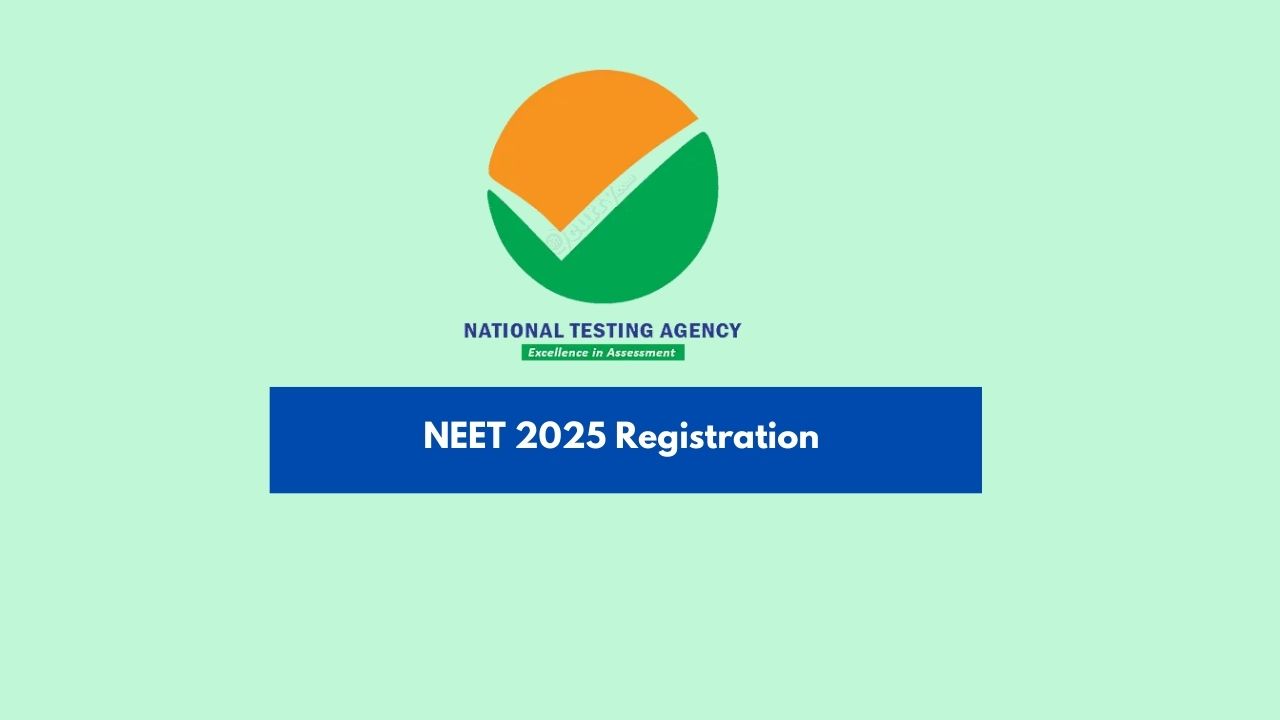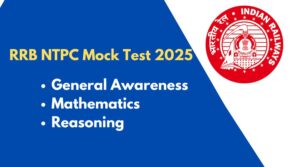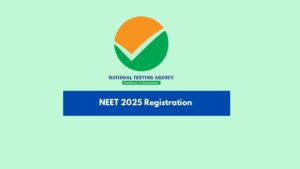NEET Syllabus 2025 – with a Great Study Plan for NEET 2025
The NEET Syllabus 2025 has been finalized by the Undergraduate Medical Education Board (UGMEB) under the National Medical Commission (NMC).
NEET Syllabus 2025
The National Eligibility cum Entrance Test (NEET) is a highly significant entrance exam for students in India who aspire to pursue undergraduate medical and dental courses. The NEET exam also serves as the gateway for admission to prestigious medical institutions like AIIMS and JIPMER. So, NEET Syllabus 2025 plays a crucial rule in the preparation journey. In this article, we will discuss about NEET Syllabus in detailed.
NEET Syllabus 2025 Overview
| Exam Name | National Eligibility cum Entrance Test (NEET) |
| Conducting Body | National Testing Agency (NTA) |
| Exam Frequency | Once in a year |
| Mode of Exam | Offline [Pen – Paper] |
| Medium of Exam | Assamese, Bengali, Gujarati, Hindi, Kannada, Kashmiri, Konkani, Malayalam, Manipuri, Marathi, Nepali, Oriya, Punjabi, Sanskrit, Sindhi, Tamil, Telugu, Urdu, Bodo, Santhali, Maithili, and Dogri. |
| Subjects | Physics, Chemistry, Zoology and Botany |
| Total No. of Questions | 180 [ Compulsory ] |
| Duration of Exam | 200 minutes (03 hours 20 Minutes) |
| Marking System | Correct answer or the most appropriate answer: Four marks (+4) Any incorrect option marked will be given minus one mark (-1) Unanswered: No mark (0 |
NTA NEET UG 2025 Official Syllabus Download PDF
The syllabus for NEET UG 2025 has been finalized by the Undergraduate Medical Education Board (UGMEB) under the National Medical Commission (NMC). The syllabus was officially released on December 14, 2024. The syllabus includes Physics, Chemistry, Zoology and Botany. Students can Download the NTA NEET Official Syllabus from the link below.
Click Here to Download NTA NEET Official Syllabus 2025
Subject Wise NTA NEET Syllabus 2025
| Chemistry for NEET 2025 | Physics for NEET 2025 | Zoology + Botany |
| Some Basic Concepts in Chemistry | Physics and Measurement | Diversity in Living World |
| Atomic Structure | Kinematics | Structural Organization in Animals and Plants |
| Chemical Bonding and Molecular Structure | Laws of Motion | Cell Structure and Function |
| Chemical Thermodynamics | Work, Energy, and Power | Plant Physiology |
| Solutions | Rotational Motion | Human Physiology |
| Equilibrium | Gravitation | Reproduction |
| Redox Reactions and Electrochemistry | Properties of Solids and Liquids | Genetics and Evolution |
| Chemical Kinetics | Thermodynamics | Biology and Human Welfare |
| Classification of Elements and Periodicity in Properties | Kinetic Theory of Gases | Biotechnology and Its Applications |
| P-Block Elements | Oscillations and Waves | Ecology and Environment |
| d- and f-Block Elements | Electrostatics | |
| Coordination Compounds | Current Electricity | |
| Purification and Characterization of Organic Compounds | Magnetic Effects of Current and Magnetism | |
| Some Basic Principles of Organic Chemistry | Electromagnetic Induction and Alternating Currents | |
| Hydrocarbons | Electromagnetic Waves | |
| Organic Compounds Containing Halogens, Oxygen, Nitrogen | Optics | |
| Biomolecules | Dual Nature of Matter and Radiation | |
| Principles Related to Practical Chemistry | Experimental Skills |
NTA NEET 2025 Official Website
NTA NEET 2025 Registration, Exam Pattern, Exam Date
Comprehensive Study Plan for NEET 2025
1. Understand the Syllabus and Exam Pattern
- Get a clear understanding of the NEET 2025 syllabus.
- Familiarize yourself with the NEET exam pattern, including the subjects, types of questions, and marking scheme.
2. Create a Realistic Timetable
- Daily Schedule: Dedicate 6-8 hours daily for NEET preparation.
- Weekly Targets: Set weekly targets for each subject and topic.
- Breaks and Recreation: Include short breaks and recreational activities to avoid burnout.
3. Subject-Wise Strategy
Physics:
- Focus on understanding concepts rather than rote learning.
- Divide the syllabus into units and allocate specific days to each unit.
- Practice numerical problems regularly.
- Important Topics: Mechanics, Electrodynamics, Thermodynamics, Modern Physics, Optics.
Chemistry:
- Break down the NEET syllabus 2025 into Physical, Organic, and Inorganic Chemistry.
- Allocate time for theory and practical applications.
- Regularly revise chemical reactions and equations.
- Important Topics: Chemical Bonding, Coordination Compounds, Thermodynamics, Electrochemistry, Organic Chemistry basics.
Biology:
- Pay attention to diagrams, processes, and terminology.
- Use NCERT textbooks for in-depth understanding.
- Regularly revise important chapters.
- Important Topics: Genetics, Human Physiology, Plant Physiology, Ecology, Cell Biology.
4. Regular Revision
- Weekly Revision: Spend weekends revising the topics you covered during the week.
- Monthly Revision: Review the entire month’s syllabus at the end of each month.
- Revision Notes: Maintain concise notes for quick revision.
5. Practice Mock Tests and Previous Years’ Papers
- Start with chapter-wise tests and gradually move to full-length mock tests.
- Solve previous years’ NEET question papers to get an idea of the exam pattern.
- Analyze your performance, identify weak areas, and work on improving them.
6. Focus on Time Management
- Practice solving questions within the allotted time.
- Work on speed and accuracy.
- Time each section during mock tests to get used to the actual exam scenario.
7. Stay Healthy and Stress-Free
- Follow a balanced diet and stay hydrated.
- Include physical activities and exercise in your routine.
- Ensure adequate sleep to keep your mind fresh and active.
8. Seek Guidance and Clarify Doubts
- Join coaching classes or online courses if needed.
- Regularly interact with teachers and mentors to clarify doubts.
- Participate in discussion groups with peers to exchange knowledge.
9. Motivation and Positive Mindset
- Stay motivated and keep a positive mindset during the preparation of NTA NEET 2025
- Set short-term goals and reward yourself upon achieving them.
- Visualize your success and stay focused on your ultimate goal.
FAQs
What is NEET?
NEET (National Eligibility cum Entrance Test) is a national-level entrance exam conducted by the National Testing Agency (NTA) for admission to undergraduate medical and dental courses (MBBS, BDS) in India.
Who conducts NEET?
NEET is conducted by the National Testing Agency (NTA).
Why is NEET important?
NEET is the sole entrance exam for admission to medical and dental colleges in India, ensuring a standardized and fair selection process for all candidates. The NEET exam also serves as the gateway for admission to prestigious medical institutions like AIIMS and JIPMER.
What are the eligibility criteria for NEET?
Candidates must have completed or be appearing for their 12th standard (or equivalent) examination with Physics, Chemistry, Biology/Biotechnology, and English as core subjects. The minimum age requirement is 17 years, and the maximum age is 25 years for general category candidates (30 years for reserved categories).
How do I apply for NEET?
Candidates can apply for NEET online through the official NTA website by filling in the necessary details, uploading required documents, and paying the application fee.
What is the application fee for NEET?
The application fee varies based on the category:
General category: Rs. 1600
General-EWS/OBC-NCL: Rs. 1500
SC/ST/PwD/Transgender: Rs. 900
What is the exam pattern for NEET?
NEET consists of multiple-choice questions (MCQs) from three subjects: Physics, Chemistry, and Biology. The exam is 3 hours and 20 minutes long. Each correct answer earns 4 marks, and each incorrect answer incurs a negative marking of 1 mark.
How should I prepare for NEET?
Focus on understanding concepts in Physics, Chemistry, and Biology. Practice previous years’ question papers and take mock tests. Develop a study schedule and regularly revise important topics.










Post Comment